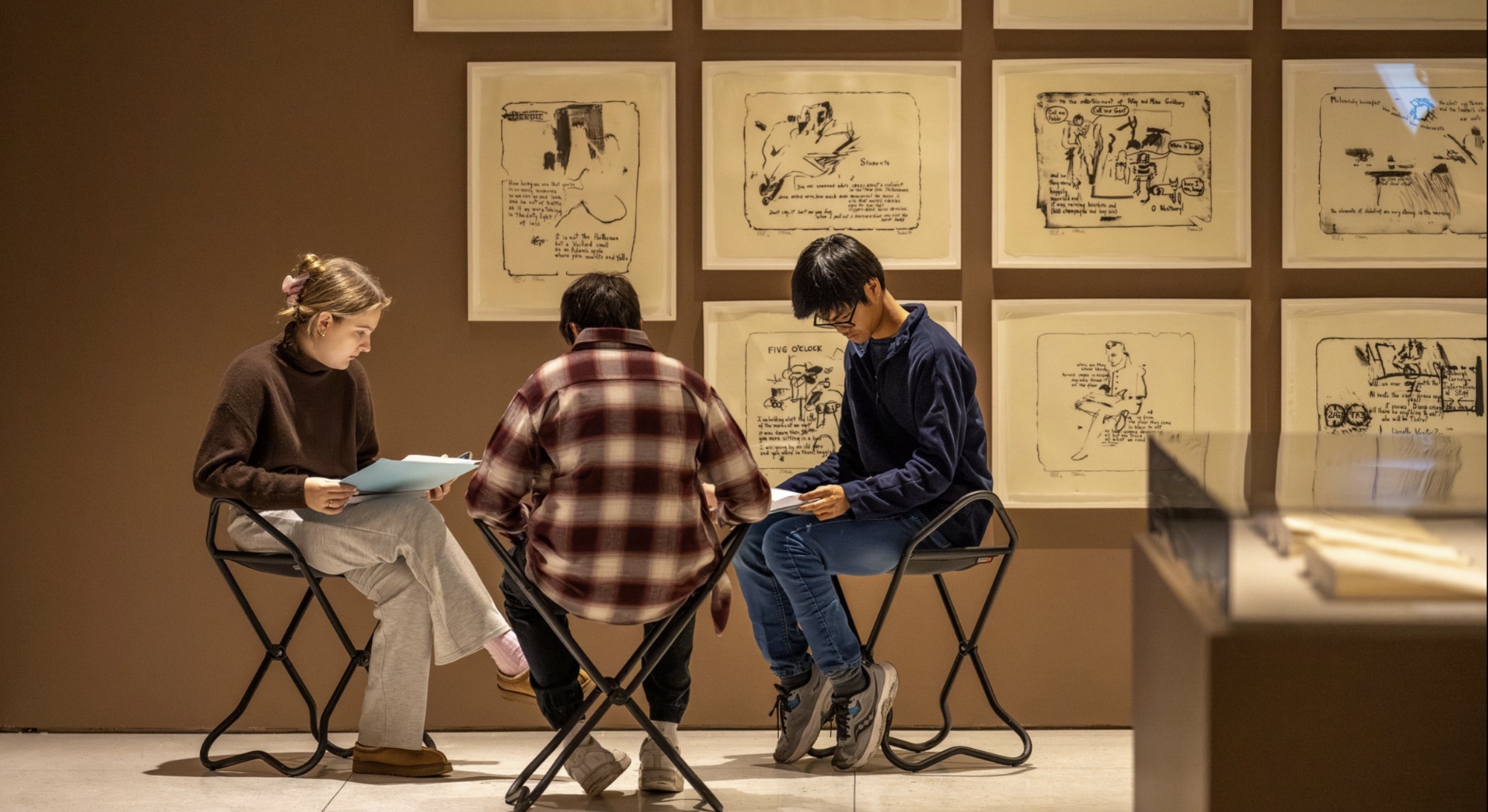
Students enrolled in the Humanities Core sequence Poetry and the Human work on an assignment at the Smart Museum’s Poetry Is Everything exhibition. (Photography by Jason Smith)
Poet and humanities lecturer Richie Hofmann explains why that’s the wrong question.
For the poetry section of the Fall/24 Core, humanities lecturer Richie Hofmann selected three student poems written for his course Poetry and the Human this past spring. Hofmann, whose work has been published in the New Yorker, the Paris Review, Poetry, and other journals, taught the Humanities Core course for the first time this past academic year.
During the Fall and Winter quarters, all students in Poetry and the Human study poetry from an academic perspective. In Spring, they have the option to switch to an affiliated Arts Core course and write their own poems instead of papers.
But how do you teach something as subjective and complex as poetry writing? The Core asked Hofmann to explain how he does it. This interview has been edited and condensed.
What kind of students choose the creative writing option for Spring?
You get students who are poetry die-hards, and students who just stumble into it.
Pretty much everyone is a first-year doing their Core requirements, though the course is open to everyone. We have loads and loads of students on the waitlist.
As scary as it sounds to write your own original poems and share them with a group, it seems like students are hungry for spaces where their creativity can be honored and given rigorous academic discussion.
The syllabus listed haiku, sonnet, and ghazal, but no free verse. Do you cover that?
Not directly. The Spring syllabus is all about structure and how structures create meaning.
There’s something about the compression of these forms—in haiku, the very strict syllable requirement, or the set number of lines, 14, in the sonnet—that contributes to the poem’s shaping. Working in these strictures often leads to new discoveries in your thinking.
Your syllabus has a low-tech focus: no laptops in class, all work submitted in hard copy.
I’m kind of old school. I crave a couple of hours a week when I’m not on my screen. I’m by no means anti-tech, but it’s wonderful to have a couple of hours to engage respectfully with creative work.
In this course we’re sharing and reading out loud brand-new drafts of poems. There’s a lot of vulnerability. It’s more respectful to meet that bravery face-to-face, rather than be distracted by these devices that are meant to distract us. I love to have the environment defined by the poem.
I also have students write by hand in notebooks. That’s something we do at the beginning of every class. There’s no assignment. It’s just a space to meditate.
Students give their feedback by hand as well. They annotate each poem with their ideas for revision and their notes to the author. I wanted to underscore the intimacy of the writing process. I find that students quickly buy in.
Workshopping poetry sounds so difficult. How do you know if a poem is good?
We shy away from evaluative questions. I always think of this quote by the English poet W. H. Auden: “Here is a verbal contraption. How does it work?”
So whether we’re looking at the work of one of the greats, like Shakespeare or Basho, or one of the student poems that is up for workshop, we ask, how does it work? What literary devices are we noticing? What kind of moods and impressions are being created through the language, through its form on the page?
Can we engage sensuously with the imagery? What about the sound the poem produces? Is it mellifluous and pleasant, or kind of grimy and hard-edged? And how does that relate to the emotions at the heart of the piece?
I ban students from saying “I like” or “I don’t like.” It’s more helpful for the writer being workshopped for someone to “notice.” We change “I like” statements to “I notice.”
It’s kind of playful. Everyone catches themselves saying “I like,” because it’s our first impulse. I do it all the time. But it’s lovely to see, as the quarter goes on, students redirecting their feedback.
I was so taken by this line in your syllabus: “Read attentively and participate dazzlingly in class discussion.” Especially the word dazzlingly.
I feel like I have to take a risk in my own writing, even syllabus writing. I hope that models that writerly imperative—trying the risky thing.
